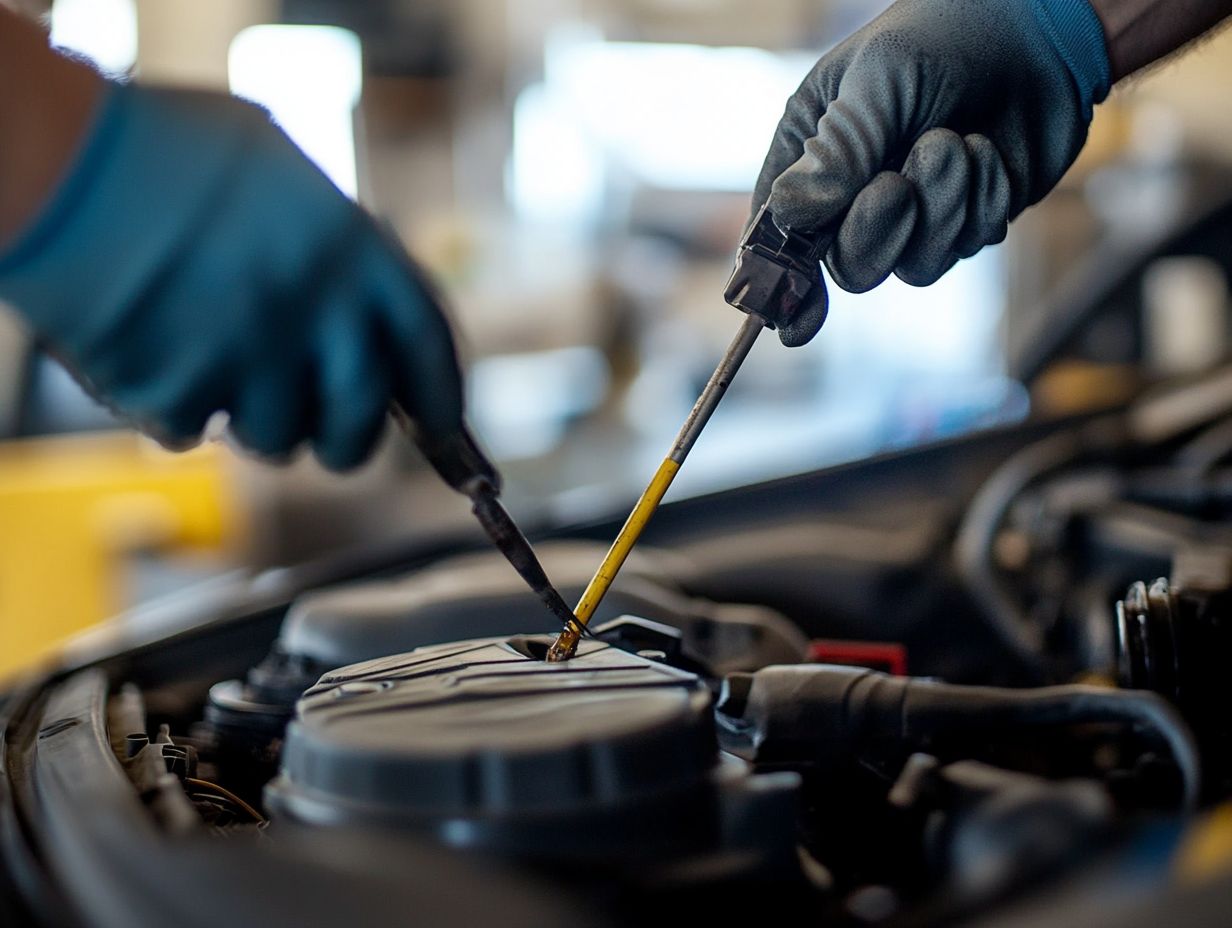What Are Common Signs of Transmission Issues?
Transmission issues can truly be a car owner’s worst nightmare, often resulting in costly repairs and unexpected breakdowns that disrupt your routine.
It’s essential for you to grasp how your vehicle’s transmission operates; this knowledge is key to identifying potential problems before they escalate.
By being attentive to unusual noises, difficulty shifting gears, fluid leaks, and any burning smells, you ll be better equipped to recognize the warning signs and save both time and money in the long run.
This guide gives you the lowdown on common transmission problems, their underlying causes, and effective solutions, ensuring your vehicle continues to run smoothly for years ahead.
Contents
- Key Takeaways:
- Understanding Transmission Issues
- Common Signs of Transmission Issues
- Causes of Transmission Issues
- Addressing Transmission Issues
- Frequently Asked Questions
- What are common signs of transmission issues?
- Why Is It Important to Recognize Signs of Transmission Issues?
- Can Low Transmission Fluid Cause Issues?
- What Does It Mean If My Car Makes Unusual Noises When Shifting Gears?
- Are Transmission Issues Common in Older Vehicles?
- How Can I Prevent Transmission Issues?
Key Takeaways:

- Unusual noises or vibrations, difficulty shifting gears, and leaking fluids are common signs of transmission issues that should not be ignored.
- Causes of transmission issues include normal wear and tear, lack of maintenance, and external factors, such as accidents.
- When faced with transmission issues, it is important to properly diagnose the problem and consider repair or replacement options. Ignoring the issue can lead to more costly repairs in the future.
Understanding Transmission Issues
Grasping the intricacies of transmission issues is vital for every car owner, as these problems can profoundly affect your vehicle’s performance and safety.
The transmission system is a critical element, tasked with transferring power from the engine to the wheels, ensuring seamless gear shifts and optimal driving experiences.
When transmission troubles surface, they can present themselves in a variety of ways, such as slipping gears, unexpected noises, or that ominous check engine light illuminating your dashboard.
Identifying issues early can help you avoid costly repairs. By conducting timely maintenance on your transmission system, you can avert breakdowns, ultimately helping your vehicle last longer.
What is a Transmission and How it Works
A transmission is an essential component of your vehicle that facilitates the transfer of power from the engine to the wheels, allowing your car to move efficiently.
This sophisticated system can be categorized into two primary types: automatic and manual.
An automatic transmission shifts gears seamlessly, employing hydraulic systems which use fluid pressure to operate to manage power transfer without any need for your intervention.
On the other hand, a manual transmission requires you to engage and disengage gears using a clutch pedal and gear lever, granting you greater control over your vehicle’s performance.
Transmission fluid is crucial for both types, serving as a lubricant to minimize wear and providing the hydraulic pressure necessary for smooth operation.
Understanding the mechanics behind gear shifting whether through automatic sensors or manual engagement is vital for maintaining optimal performance in your vehicle.
Common Signs of Transmission Issues
Recognizing the common signs of transmission issues gives you the power to tackle problems before they evolve into more serious transmission failures. This proactive approach can save you from costly repairs down the road act now!
Unusual Noises or Vibrations
Unusual noises or vibrations while driving can signal underlying transmission issues that demand your immediate attention.
Listening for grinding or whining sounds can help you pinpoint potential problems before they escalate into serious damage.
For instance, a grinding noise often hints at gears not engaging properly, which could result in increased wear and tear on the transmission system.
Conversely, a whining sound may suggest low fluid levels or a failing pump both of which can significantly jeopardize your vehicle’s performance.
Regular maintenance checks and prompt repairs can prevent these noises from becoming bigger issues, ensuring a smoother and safer driving experience for you.
Difficulty Shifting Gears

Experiencing difficulty shifting gears in an automatic or manual car may signal serious transmission issues.
These problems can show up whether your car is cold or has been running for a while. Low transmission fluid is a common issue that can cause rough shifts or prevent your car from engaging gears.
Another concern is a failing torque converter, which can create a slipping sensation during gear changes. It’s crucial to seek a professional inspection.
A qualified mechanic can identify the problems and suggest repair options to keep your car safe and efficient.
Leaking Fluids
Leaking transmission fluid is a serious warning sign you should never ignore.
Identifying leaks early can save you time and big repair costs. Transmission fluid is typically reddish and has a distinct oily smell, making it relatively easy to spot.
Ignoring these leaks can lead to transmission failure or a breakdown, leaving you stranded and facing high towing fees. Regular checks are essential to catch leaks early.
By staying proactive, you’ll enhance your vehicle’s longevity and ensure a safer driving experience. Timely repairs can prevent minor issues from becoming major headaches.
Burning Smell
A burning smell while driving can indicate overheating transmission fluid, signaling urgent issues.
This often stems from low fluid levels or contaminated fluid, and you should watch for slipping gears, delayed engagement, or unusual noises.
Ignoring these signs could lead to significant damage and costly repairs. Addressing issues quickly can lead to a smoother driving experience and protect your car’s long-term health.
Causes of Transmission Issues
Transmission issues can arise from normal wear and tear, poor maintenance, or outside factors. Being aware of these causes helps ensure your car operates smoothly.
Normal Wear and Tear
Normal wear on your car’s transmission is part of its lifecycle. Knowing this allows you to plan for maintenance.
Components like the gearbox and torque converter deteriorate over time, leading to problems like slipping gears. Regular transmission service is vital for catching issues early.
If you overlook maintenance, minor wear can escalate into costly repairs. Be proactive to protect your investment!
Lack of Maintenance

Ignoring regular maintenance can cause major transmission problems. This care includes changing the transmission fluid regularly. Old or dirty fluid can harm performance because it loses its ability to keep parts cool and lubricated.
It’s also essential to check for leaks. Just a small drip can lower fluid levels, putting strain on the system and leading to expensive repairs. Stick to a solid maintenance schedule! Spotting potential issues early can save you money and keep your transmission running smoothly.
External Factors
Extreme heat or cold can seriously affect your vehicle’s transmission. Temperature changes can alter the fluid’s thickness. In cold weather, the fluid may thicken, making gear shifts hard.
When it s hot, the fluid can become too thin, resulting in inadequate lubrication. Regularly check your transmission fluid, especially with changing seasons. Catching issues early can prevent costly repairs and help your vehicle last longer!
Addressing Transmission Issues
Addressing transmission problems right away is vital. Understanding your options for diagnosing these problems can streamline the repair process.
Diagnosing the Problem
Diagnosing transmission issues usually requires experienced technicians. These experts connect diagnostic tools to your vehicle’s computer. This helps them read trouble codes and assess your transmission s condition.
Common tests like fluid level checks and visual inspections help find the problem. These methods allow technicians to identify the root cause and suggest repairs.
Repair or Replacement Options
When facing transmission issues, you need to decide between repair and replacement. Your decision depends on the issue’s severity and your vehicle’s age. Minor issues might be cheaper to fix, while major failures may need a complete replacement.
Talk to qualified technicians! Their advice can help you make the best financial decision for your vehicle.
Frequently Asked Questions

What are common signs of transmission issues?
Some common signs of transmission issues include slipping gears, delays in shifting, unusual noises, leaking transmission fluid, and a burning smell. If you’re experiencing these symptoms, it may be time to learn what the signs of a failing clutch are.
Why Is It Important to Recognize Signs of Transmission Issues?
Spotting signs of transmission issues early can prevent further damage and save you money on repairs. It also ensures safe driving, reducing the risk of accidents.
Can Low Transmission Fluid Cause Issues?
Yes, low transmission fluid can cause problems like difficulty shifting gears, slipping, and overheating. Regularly check your transmission fluid levels to avoid these issues.
What Does It Mean If My Car Makes Unusual Noises When Shifting Gears?
Noises like grinding or whining while shifting could signal a transmission problem. It s best to have a mechanic take a look to find the cause.
Are Transmission Issues Common in Older Vehicles?
Yes, older vehicles are more prone to transmission issues due to wear and tear. Regular maintenance is key to avoiding potential problems.
How Can I Prevent Transmission Issues?
Maintaining your vehicle by changing the transmission fluid and filter can help prevent issues. Additionally, drive carefully to reduce stress on the transmission.






